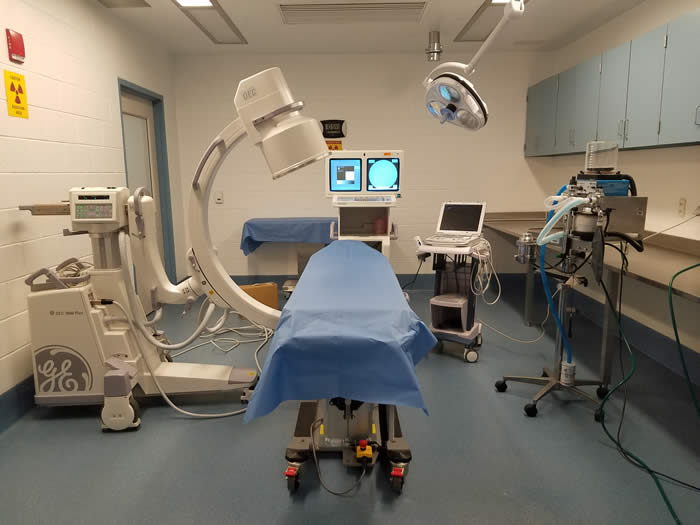Radiology Simulation and Research Facility
Innovation Collaboration Technology Education
The Rutgers NJMS Radiology Simulation and Research Facility is a state of the art facility based in the comparative anatomy laboratories of Rutgers- NJMS. Within this facility, a variety of vascular and non-vascular interventions can be performed with the provided resources. The angiography lab and the equipment are available for endovascular research and training, animal in vitro procedures as well as live animal in-vivo procedures.

Fluoroscopic C-Arm
A dedicated full-size fluoroscopy unit (GE OEC 9800 Plus) is on site and available for teaching or research, and features real time-fluoroscopy, digital subtraction imaging, image storage and processing. Radiation protection gear is available for use. The full size fluoroscopic unit is housed in a room suitable for large animal studies. A radiology technician will be available to run the machine and to monitor the procedures for radiation safety. Time for machine and room use must be scheduled in advance. Contrast, if needed, must be ordered in advance. Radiation dosimetry badges must be worn during fluoroscopic procedures. Temporary badges are available, but you may use your own badge if you work within the institution at NJMS/UH.
Ultrasound
Dedicated research machine (Mindray M7) is available for use with animal studies, in vitro studies and silicone/plastic models and phantoms. The unit is has the capacity for multiple protocols, including real time imaging, doppler flow imaging, M-mode and power doppler. Resources to store and process ultrasound pictures are available. Currently, there are a standard, 12 MHz linear transducer and a 5-2 MHz curvilinear available for use. Other transducers may be able to be acquired as needed.
Vascular Simulation Models
There are adult, life size silicone arterial and venous angiographic model systems available for use. These systems are modular and can include many of the larger vessels of the human body, in order for users to simulate neurologic, cardiac, thoracic, abdominal, and peripheral endovascular interventions, as well as venous interventions. The models are clear, therefore able to be used with fluoroscopic and video imaging with or without contrast. They can be used alone, or attached to a peristaltic pump so that the fluid mimics real blood flow through the vessels.
The abdominal module includes celiac, SMA, renal, and IMA vessels with large order branches. The Thoracic module has carotids, vertebral, and subclavian arteries. The neurologic simulation module includes the circle of Willis and a choice of aneurysm type and vessel tortuosity. The cardiac model has replaceable and static coronary vessels, which can be used with endovascular equipment.
The Vena cava heart model has large vessel venous anatomy from the common femoral arteries to the internal jugular veins. It also has simplified pulmonary arteries. The accesses are through the jugular and femoral ports.
If needed, additional modules including the upper and lower extremity vessels can be acquired. Thoracic and abdominal aortic models simulating infra and suprarenal aortic aneurysms can also be acquired. There is capacity to include models that include cardiac valves and puncturable septae for advanced intra-cardiac interventions. Additional ports or configurations can be made to order.
Patient specific modules ( neurologic and aortic) can be manufactured by an outside supplier as needed to help guide clinicians in their patient care for challenging cases. Good quality CT or MRI angiograms must be submitted well in advance for the supplier to evaluate and produce the model.
Vivarium/Tissue Services
The vivarium has the ability to house and care for small and large animals being used for research protocols. On site staff must be used for any animal studies performed. They are available for animal acquisition, care, anesthesia, and operative services. The full range of animal veterinary services are available, including pre and post-operative care, anesthesia, operative services as well as dissection, necropsy, organ and tissue harvest, as well as proper disposal. All live animal studies and interventions must have protocols approved by the local Institutional Animal Care and Use Committee (IACUC). Onsite staff can provide guidance to navigate the regulatory framework, to ensure the judicious and humane use of research animals. Organ/tissue services are available; individual, fresh animal organs for research or training can be ordered from local suppliers as needed.
Conference Services
Within the vivarium itself, there is a conference room suitable for 12-20 people. Resources in the medical and dental school campuses are available for larger conference hosting as scheduling permits. There are a variety of meeting rooms to suit all needs, as well as beverage and food services that can be arranged for small and large meetings. Travel logistics including local hotels and transportation are available upon request. There is an institution-based NJMS Simulation Center with multiple phantoms and facilities including multiple rooms for training purposes. The full range of AV services are available from the institution upon request.
Please send any research or training requests, project proposals, or questions to:
Dr. Sharon Gonzales : gonzalsh@njms.rutgers.edu
Administrative and financial questions can also be directed to:
Natalie Colimon-Fitzgerald: nc204@njms.rutgers.edu
Updated 8/27/2020

